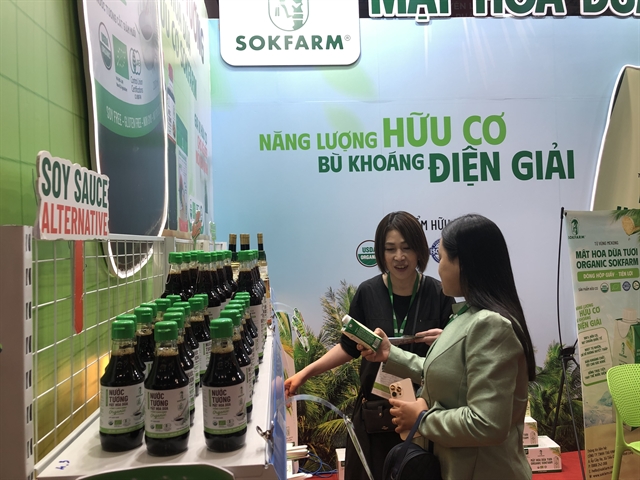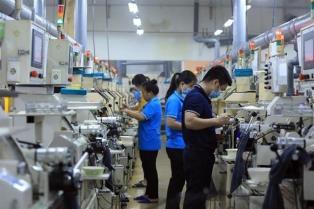Accelerating digital trade promotion, particularly on B2B e-commerce platforms, is creating unprecedented opportunities for Vietnamese enterprises to showcase their brands, affirm product quality, and add value in the global food supply chain.
HCM CITY — Accelerating digital trade promotion, particularly on B2B e-commerce platforms, is creating unprecedented opportunities for Vietnamese enterprises to showcase their brands, affirm product quality, and add value in the global food supply chain.
Deputy Minister of Industry and Trade Phan Thị Thắng made these remarks at the International Vietnam Food Forum 2025 themed “Vietnam Food Brand – Breakthrough from Digital Trade Promotion” in HCM City on November 12.
Thắng highlighted that the food and beverage sector plays a vital role in national economic development, serving as a bridge between agriculture and processing industries. The sector not only adds value to agricultural products but also boosts consumption and increases farmers’ incomes.
“In the context of globalisation and integration, enhancing competitiveness, ensuring sustainable growth, and building strong brands for Vietnamese products have become urgent priorities,” she said.
The conference theme underscored the industry’s shift from traditional trade promotion to digital platforms. This shift enables Vietnamese enterprises to connect directly with international partners, expand markets efficiently, optimise costs, shorten transaction times, and measure promotional outcomes transparently.
“Strengthening digital trade promotion, especially on B2B e-commerce platforms, is unlocking vast opportunities for Vietnamese enterprises,” Thắng said. She added that this approach aligns with global trends and implements Resolution No. 57-NQ/TW on breakthroughs in science, technology, innovation, and national digital transformation. The theme also reflects the Vietnam National Brand Programme’s long-term goal of promoting Việt Nam as a producer of high-quality, safe, innovative, and high-value-added products.
Global e-commerce opportunities
In a presentation titled “Promoting Việt Nam’s Food & Beverage in Global Trade: The Urgency of Breakthrough Technology Adoption,” Young Liu, head of Vietnam Business at Alibaba.com, said that global B2B e-commerce has grown at an annual rate of 14.5 per cent over the past five years and is projected to reach US$36.16 trillion by 2026. By 2033, ASEAN is expected to become one of the world’s fastest-growing trade hubs, strengthening ties within Asia and with major global economies.
As global trade uncertainties arise, businesses are exploring diverse supply sources, creating opportunities for Vietnamese suppliers, Liu noted.
Among the fastest-growing sectors in cross-border e-commerce are food and beverages, especially meat, grains, dairy, eggs, vegetables, spreads, and sweeteners. Packaged foods, including confectionery, beverages, and sauces, continue to dominate demand.
Vietnamese products are attracting increasing attention from international buyers due to their diversity, distinctive flavours, and improved traceability and packaging.
From July to September 2025, demand surged for made-in-Vietnam products on Alibaba.com in the US, Bangladesh, Mexico, the United Kingdom, India, Canada, and Japan, while EU countries maintained consistently high search volumes.
He added that Alibaba.com has partnered strategically with MoIT and Vietrade to promote Vietnamese brands through initiatives such as the Vietnam Pavilion, an exclusive front page dedicated to made-in-Vietnam goods. The platform supports business networking and enhances global recognition of Vietnamese products. It has also launched initiatives to support sellers, including Ali-Edu training programmes, Co-Create initiatives, a Guarantee Package for business continuity, and upgraded AI-based tools to help businesses optimise operations and reach new customers.

Nguyễn Việt An, director of the Innovation Support Centre, Ministry of Science and Technology, said cross-border e-commerce has become a crucial export channel for agricultural and food products, with global market value estimated at US$477.5 billion in 2024 and projected to reach nearly US$2 trillion by 2034. Rising demand for specialty, healthy, and organic products with traceable origins drives growth in major markets, including China, the US, the EU, Japan, and South Korea.
For Việt Nam, with its strengths in rice, coffee, cashew nuts, pepper, fruit, seafood, and processed foods, cross-border e-commerce offers a “digital highway” that connects producers directly with global consumers and high-value importers.
Online export value is estimated at $3.4–3.5 billion in 2023 and is expected to exceed $12 billion by 2027. Sales of Vietnamese products on Amazon alone have increased by more than 300 per cent over the past five years, reaching nearly 18 million items.
However, challenges remain, he said. They include fragmented supply chains, seasonal production, inconsistent quality, high logistics and cold-chain costs, and limited digital capacity among SMEs. Meeting international standards such as ISO, FDA, Halal, and BRC, as well as ensuring full traceability, transparency, and digital documentation, is essential to sustain export growth.
Building a sustainable digital food ecosystem
Forum participants proposed several key measures to accelerate digital trade promotion and strengthen competitiveness. At the policy level, they recommended developing a National Strategy for Cross-Border E-Commerce in Food Exports, integrating it into innovation, digital economy, and logistics policies. They also suggested promoting a “Vietnam Digital Food Passport” system using QR or GS1 codes integrated with testing and certification data and applying blockchain or IoT technology for key products such as coffee, cashew, fruit, and seafood.
Participants also emphasised expanding cold storage, packaging, and fulfilment centres dedicated to online food exports, along with providing tax, fee, and green credit incentives for logistics enterprises supporting food exporters.
At the enterprise level, businesses should ensure that each export product has clear quality standards and a complete digital profile, select suitable e-commerce platforms, invest in brand storytelling highlighting origin, sustainability, and authenticity, strengthen digital competencies or partner with specialists for online store management, SEO, advertising, and customer care, and foster value-chain linkages with cooperatives and farmers to standardise quality, traceability, and delivery schedules.
The event was organised by Vietrade in collaboration with Alibaba.com and other domestic and international partners as part of the Vietnam International Food Industry Exhibition, held at the Saigon Exhibition and Convention Centre from November 12–15. — VNS




